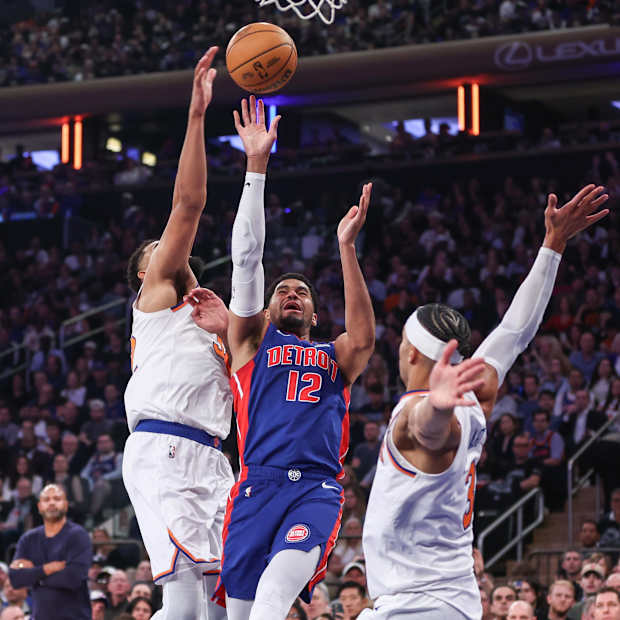Analyzing The Knicks' Overtime Defeat: What Went Wrong?

Table of Contents
Offensive Struggles in the Fourth Quarter and Overtime
The Knicks' offense experienced a significant downturn in the fourth quarter and overtime, ultimately costing them the game. This Knicks offense, usually a strong point, faltered under pressure. Key aspects of their offensive struggles include:
-
Scoring Drought: The team endured a crippling scoring drought lasting over four minutes in the final period, allowing the opposing team to gain a significant lead. This extended period without points highlighted a critical breakdown in offensive flow.
-
Poor Shot Selection: Instead of focusing on high-percentage shots, the Knicks forced several contested jumpers and rushed possessions, leading to turnovers and missed opportunities. Improving shot selection is paramount for future success.
-
Lack of Offensive Rebounding: The Knicks struggled to secure offensive rebounds, failing to capitalize on second-chance scoring opportunities. This lack of hustle on the boards compounded their offensive woes.
-
Star Player Underperformance: The typically high-scoring [Name of Star Player] had an uncharacteristically low shooting percentage, further exacerbating the team's offensive woes. His performance directly impacted the Knicks' ability to score in crucial moments. Analyzing his shot selection and decision-making will be key to preventing similar future occurrences.
Defensive Breakdown in the Final Minutes
While the Knicks' offense sputtered, their defense also experienced a critical collapse in the final minutes. Several key defensive lapses contributed to their overtime loss:
-
Key Defensive Lapses: The opposing team consistently exploited gaps in the Knicks' defensive rotations, leading to easy baskets. These defensive breakdowns were particularly evident in transition and pick-and-roll situations.
-
Communication Issues: A lack of clear communication between defensive players resulted in confusion and mismatches, allowing easy penetration and scoring opportunities for the opposing team. Improving communication and defensive coordination is critical.
-
Defensive Rebounding Weakness: The Knicks' failure to secure defensive rebounds in the closing stages allowed the opposing team to maintain possession and extend their offensive possessions. The inability to secure rebounds led to many second-chance points.
-
Specific Plays: The [mention specific plays, e.g., a missed defensive assignment leading to a game-tying three-pointer] highlights the severity of the defensive breakdowns. A deeper analysis of these critical moments will be essential to preventing future collapses.
Coaching Decisions Under Scrutiny
The Knicks' coaching staff also came under scrutiny following the game. Several strategic decisions raised questions:
-
Late-Game Strategy: The team's late-game strategy appeared to lack decisiveness, with the coaching staff seemingly unprepared for the opponent's late-game adjustments.
-
Substitution Patterns: The substitution pattern seemed questionable, with some players left on the court despite clear signs of fatigue or ineffective play. A more dynamic approach to substitutions might have altered the game’s flow.
-
Timeout Usage: The timing and effectiveness of timeouts were also a point of contention. In several instances, timeouts seemed poorly timed or ineffective in altering the momentum of the game.
-
Game Plan Assessment: Whether the initial game plan was appropriate or needed earlier adjustments is a subject warranting further analysis. Evaluating the success and adaptability of the game plan will inform future strategic decisions.
Impact of Injuries and Player Fatigue
The possibility of injuries and player fatigue played a significant role in the Knicks’ loss:
-
Injury Report: [Mention any player injuries and their potential impact on the game.] The absence or diminished performance of key players due to injury significantly hampered the team's overall strength and performance.
-
Player Fatigue: Several players logged significant minutes, potentially leading to fatigue and decreased effectiveness in the crucial final minutes. Monitoring player minutes and fatigue levels is crucial for preventing similar situations.
Conclusion
The Knicks' overtime defeat resulted from a confluence of factors, including offensive struggles, defensive lapses, questionable coaching decisions, and the potential impact of injuries and player fatigue. The fourth-quarter collapse and overtime struggles exposed significant weaknesses that must be addressed to prevent future Knicks overtime losses. A deeper dive into specific plays and strategic choices is needed to uncover the root causes of these issues. Further analysis of future games is crucial to determining if these issues are recurring or isolated incidents. Keep reading for more in-depth Knicks game analysis to understand their performance throughout the season and what the future holds for this team. Let us know your thoughts on this disappointing Knicks overtime loss in the comments below!

Featured Posts
-
 Olimpia Vence 2 0 A Penarol Goles Resumen Y Cronica Del Encuentro
May 16, 2025
Olimpia Vence 2 0 A Penarol Goles Resumen Y Cronica Del Encuentro
May 16, 2025 -
 Rays Complete Sweep Of Padres Tampa Bay Dominates San Diego In Series
May 16, 2025
Rays Complete Sweep Of Padres Tampa Bay Dominates San Diego In Series
May 16, 2025 -
 Toronto Maple Leafs Edge Out Avalanche With 2 1 Win
May 16, 2025
Toronto Maple Leafs Edge Out Avalanche With 2 1 Win
May 16, 2025 -
 The Kid Cudi Auction A Look At The High Selling Items
May 16, 2025
The Kid Cudi Auction A Look At The High Selling Items
May 16, 2025 -
 Five Pictures My Vont Weekend At 104 5 The Cat April 4 6 2025
May 16, 2025
Five Pictures My Vont Weekend At 104 5 The Cat April 4 6 2025
May 16, 2025
